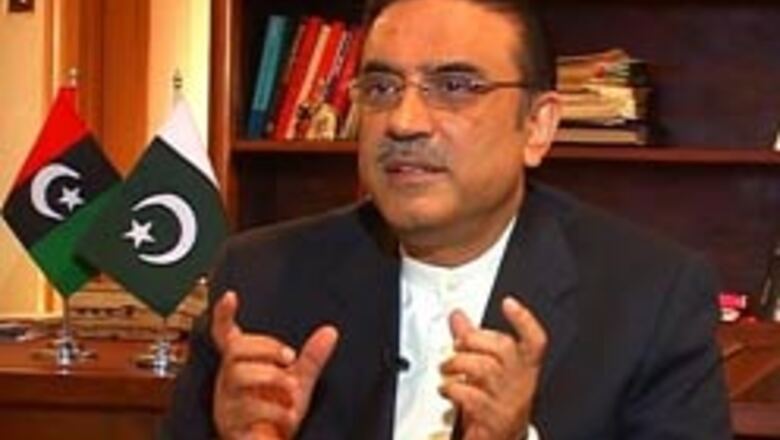
views
Islamabad: Pakistan's beleaguered President Asif Ali Zardari is seeking negotiations with opponents to end anti-government protests, his spokesman said on Saturday as authorities intensified efforts to block a march for an independent judiciary.
Spokesman Farhatullah Babar said the government had decided after a seven-hour-long meeting on Friday night to pursue efforts to defuse tensions through dialogue, reconciliation and respect for the constitution.
"The meeting expressed hope that the offer will be responded to positively by the political forces in the country," Babar said.
The offer for talks with the opposition groups came after efforts by Prime Minister Yousuf Raza Gilani, military chief Ashfaq Parvez Kayani and foreign diplomats all failed to persuade Zardari into a compromise to defuse political tensions.
An adamant Zardari told General Kayani that he could think about the reconciliation formula only after Monday when the fury of the so-called long march of lawyers was over, The News reported.
The protest march--a convoy that began in southern Pakistan and is heading toward Islamabad--and a planned sit-in beginning Monday in the capital by opposition parties and lawyers has raised concerns in Washington and other Western nations, which want the nuclear-armed country to focus on the fight against Taliban and Al Qaeda militants.
The US State Department confirmed on Friday that American officials were in contact with Pakistani leaders to resolve the political feud.
"The United States is continuing our dialogue with the main actors, the political figures in Pakistan," spokesman Gordon Duguid said.
Opposition parties and anti-government lawyers were in the midst of their cross-country march Saturday, travelling through the eastern province of Punjab en route to Islamabad.
Hundreds of black-suited lawyers gathered in the central town of Multan, where they scuffled with riot police who stopped them from embarking on their journey to Punjab's capital, Lahore.
Zardari has ordered a major police crackdown to prevent the demonstration. It has resulted in the arrests of hundreds of activists and the blockade of transmissions of at least three popular television channels covering the protests, further aggravating the political unrest.
Thousands of paramilitary troops have been called out in Islamabad, and law-enforcement agencies have seized more than 10,000 containers and trucks to block roads.
The hard-handed tactics triggered criticism from rights activists and even dissent within Zardari's own Pakistan People's Party (PPP).
Information Minister Sherry Rehman reportedly resigned after failing to persuade Zardari to lift the ban on TV telecasts. The presidential spokesman said the resignation had not been accepted by Gilani.
Rehman was the second minister to resign from the cabinet in less than two weeks.
Senator Safdar Abbasi, a senior PPP leader, lashed out Friday at Zardari while speaking at a lawyers meeting.
"You [Zardari] are losing your reputation in the party," Abbasi said. "The nation is not ready to trust you. For God's sake, restore your credibility. If you don't do this, the party will be on the receiving end."
Naheed Khan, who served as political secretary to Zardari's slain spouse and former prime minister Benazir Bhutto, said he hoped Zardari "would put his ego aside and fulfill the demand of millions of Pakistani people for reinstatement of (deposed) justice Iftikhar Chaudhry as the chief justice of Pakistan".




















Comments
0 comment